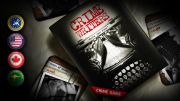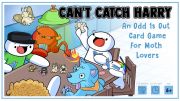Project L (Jan Soukal) – Players choose which puzzle cards to try to complete, fitting their pieces into the empty spaces on the puzzle card. When you complete a puzzle card you get any pieces back that you used on it, you get the number of points listed on the card, and you also get a new puzzle piece as a reward. Collecting more puzzle pieces allows you to attempt more complex puzzle cards that will be worth more points and will get you even more puzzle pieces.
Casual Game Crowdfunding: Puzzles, Mysteries, and Murder

This month has some truly unique offerings, from Project L (a game that rewards you with more puzzle pieces each time you solve a puzzle), to a crime writing party game and an escape room-inspired mystery puzzle contained in five postcards.
Crime Writers (Lulla Games) – A card-based party game, Crime Writers has four decks of cards: crime scene, motive, cause of death, and killer/victim. Each player draws three cards, choosing which decks to draw from. There are two phases in the game. During the first phase, each player has ten minutes to write down a crime story based on the cards they've drawn. During the second phase, players take turns revealing the title of their story while the other players ask questions to try to figure out what the story is about. The writer may only answer questions with a few allowed answers. Points are scored based on guessing various elements of the crime story and how long it takes.
Wish You Were Here (The Enigma Emporium) – A narrative-based puzzle mystery game, Wish You Were Here is inspired by escape rooms, mystery puzzle boxes, and puzzle games. You are a detective up against a master criminal. Players receive, at one time, a pack of five postcards whose images offer various puzzles to be solved in order to unravel the story. A website provides hints as needed and research with the internet is necessary. Play it either solo or cooperatively in a group.
Space Explorers (25th Century Games) – Six specialist cards are dealt face up on the table. On your turn you may either take a specialist card from the center or from the draw deck into your hand, or you may recruit a specialist from the center or from your hand by spending the correct number of resources. Each specialist has abilities, and each specialist can belong to one of five different division types. After a specialist is recruited you may check to see if you have the necessary specialist skills to launch a spacecraft and take the relevant spacecraft token. The game ends once a player has either recruited twelve specialists or the last spacecraft has been launched.
Hollywood Death Race (Mangrove Games) – You start the game by building the track, putting together the different boards. There are a minimum of ten boards in the game, and you can play around with which ones you include in the race and how many. Each player then chooses two vehicles, each of which is inspired by classic movie characters and each with its own special abilities. You may take up to three actions on your turn. Actions you can take on your turn include moving, bumping other vehicles, honking (which can be used on certain boards to cause havoc, such as initiating a T-Rex attack), and repairing. Players can also find cards that can be played on their turn to give them an assist. The first player to get both their cars across the finish line wins the game.
Lovelace & Babbage (Artana) – You play as the early pioneers of computers. Players use a shared computer to take actions to create their own code to please patrons, create subroutines, and activate their unique special abilities. When the game begins, the computer is simple and grows more complex as you play, with players' choices affecting each other. Lovelace & Babbage is designed by Scott Almes, the designer of the Tiny Epic games.
Can't Catch Harry (James Rallison) – Players are trying to collect a set of four of the same characters, but will lose points if they have devil cards in their hand by the end of the round. When you have four cards that match, you race to grab one of the moths on the table. Different moths are worth different amounts of points. The game is created by the Youtube Channel The Odd 1s Out, but if you're not familiar with their work, Can't Catch Harry is a still a light, family card game with creative artwork and cute moth figurines.
Disclosure: unless otherwise noted, we have not seen or played any of the above games. Our assessment of each is based on the information given on the crowdfunding project page.












i'm so excited to space explorers, very interesting!